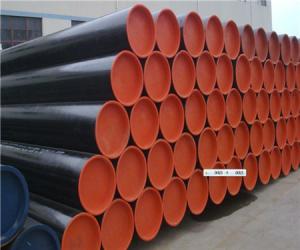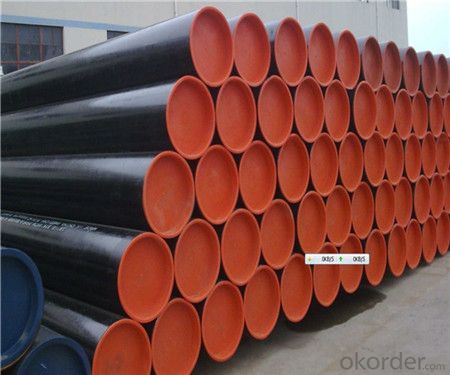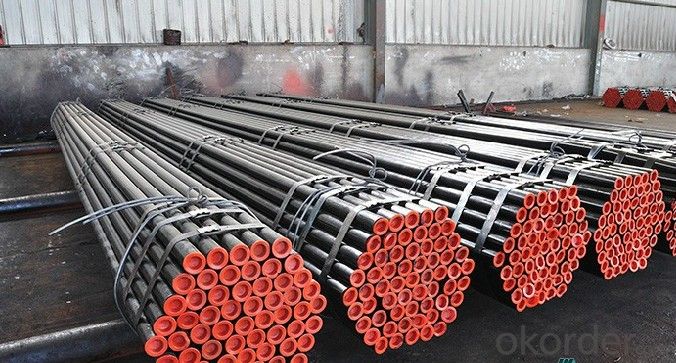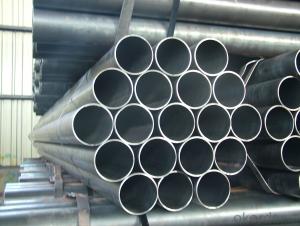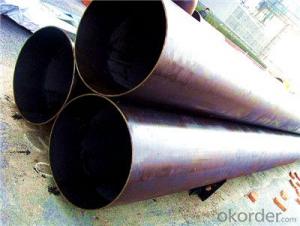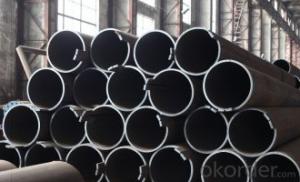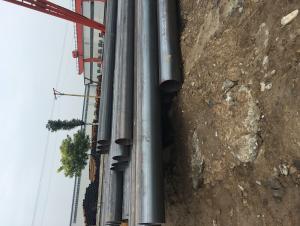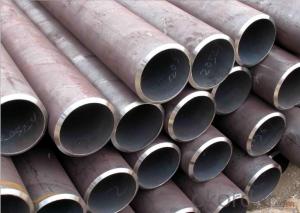Seamless Steel Alloy Pipe Supplier
- Loading Port:
- China Main Port
- Payment Terms:
- TT or LC
- Min Order Qty:
- 30 m.t.
- Supply Capability:
- 12000 m.t./month
OKorder Service Pledge
OKorder Financial Service
You Might Also Like
Product Description:
OKorder is offering high quality Seamless Steel Alloy Pipe at great prices with worldwide shipping. Our supplier is a world-class manufacturer of steel pipe, with our products utilized the world over. OKorder annually supplies products to European, North American and Asian markets. We provide quotations within 24 hours of receiving an inquiry and guarantee competitive prices.
Product Applications:
Seamless Steel Alloy Pipe is ideal for long distance oil, gas, and natural gas pipelines on land and offshore. They can also be applied in construction projects, offshore platforms, power stations, the petrochemical industry and municipal construction.
Product Advantages:
OKorder's Steel Pipe is durable, resists corrosion and is recyclable.
Main Product Features:
· Premium quality
· Prompt delivery & seaworthy packing (30 days after receiving deposit)
· Corrosion resistance
· Professional Service
· Competitive pricing
Product Specifications:
Grade: A213 A335 A199
Certification: Mill test certificate, EN 10204/31B
Dimensions:
Wall Thickness: 0.250" – 4.00" (hot finish), 0.035" – 0.875" (cold drawn)
Outer Diameter: 2" - 30" (hot finish), 0.875" - 18" (cold drawn)
Treatment: Annealed, fully annealed, bright annealed, spheroidize annealed, normalized, stress relieved, cold finished, quenched, tempered
Testing: Chemical component analysis, mechanical properties (ultimate tensile strength, yield strength, elongation), technical properties (flattening, flaring, bending, hardness, impact, etc), exterior size inspection
MOQ: 25 tons
Packaging: Bundle, beveled or plain end, varnish, PVC end caps
Seamless Pipe ASTM A106/53 Specification:
Standard | GB, DIN, ASTM ASTM A106-2006, ASTM A53-2007 |
Grade | 10#-45#, 16Mn 10#, 20#, 45#, 16Mn |
Thickness | 8 - 33 mm |
Section Shape | Round |
Outer Diameter | 133 - 219 mm |
Place of Origin | Shandong, China (Mainland) |
Secondary Or Not | Non-secondary |
Application | Hydraulic Pipe |
Technique | Cold Drawn |
Certification | API |
Surface Treatment | factory state or painted black |
Special Pipe | API Pipe |
Alloy Or Not | Non-alloy |
Length | 5-12M |
Outer Diameter | 21.3-610mm |
Grade | 20#, 45#, Q345, API J55, API K55, API L80, API N80, API P110, A53B |
Standard | ASME, ASTM |
FAQ of Seamless Pipe ASTM A106/53:
①How is the quality of your products?
Our products are manufactured strictly according to national and internaional standard, and we take a test
on every pipe before delivered out. If you want see our quality certifications and all kinds of testing report, please just ask us for it.
Guaranteed: If products’ quality don’t accord to discription as we give or the promise before you place order, we promise 100% refund.
②How about price?
Yes, we are factory and be able to give you lowest price below market one, and we have a policy that “ for saving time and absolutely honest business attitude, we quote as lowest as possible for any customer, and discount can be given according to quantity”,if you like bargain and factory price is not low enough as you think, just don’t waste your time.Please trust the quotation we would give you, it is professional one.
③Why should you chose us?
Chose happens because of quality, then price, We can give you both.Additionally, we can also offer professional products inquiry, products knowledge train(for agents), smooth goods delivery, exellent customer solution proposals.Our service formula: good quality+good price+good service=customer’s trust
SGS test is available, customer inspection before shipping is welcome, third party inspection is no problem.
Seamless Pipe ASTM A106/53 Images:
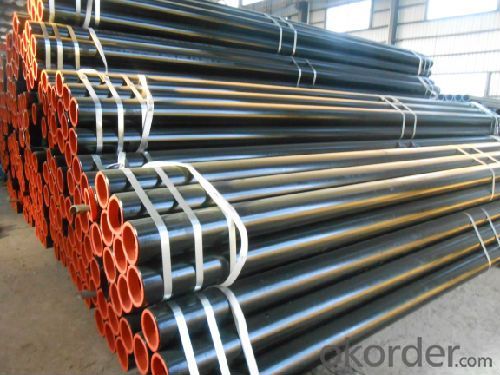
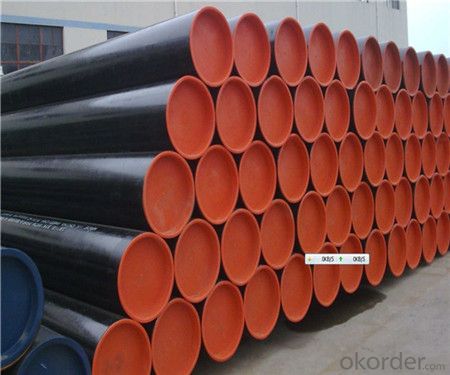
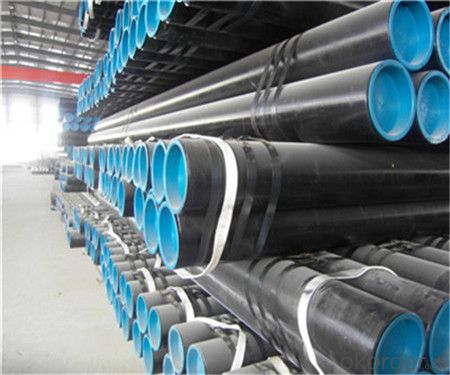
- Q: How are steel pipes used in the manufacturing industry?
- Steel pipes are used in the manufacturing industry for a wide range of applications, including the transportation of fluids and gases, structural support in buildings and infrastructure, and as a material for heat exchangers and boilers. They are also utilized in the production of various machinery and equipment, such as conveyors, cranes, and industrial piping systems. Overall, steel pipes play a crucial role in ensuring efficient and reliable operations across numerous manufacturing processes.
- Q: What are the factors that affect the lifespan of steel pipes in different environments?
- The factors that affect the lifespan of steel pipes in different environments include the presence of corrosive substances, such as chemicals or saltwater, which can corrode the steel and lead to degradation over time. Other factors include temperature fluctuations, which can cause expansion and contraction of the steel, leading to stress and potential cracking. The quality of the protective coating on the pipes also plays a role, as a strong and durable coating can provide better resistance against corrosion and prolong the lifespan of the pipes. Additionally, the maintenance and regular inspection of the pipes, including cleaning and repairs, can help identify and address any issues early on, preventing further damage and extending their lifespan.
- Q: Can steel pipes be used for solar power systems?
- Yes, steel pipes can be used for solar power systems. Steel pipes are commonly used for various applications in solar power systems, including the construction of support structures, mounting systems, and piping systems for circulating heat transfer fluids. Steel pipes are preferred due to their strength, durability, and resistance to environmental conditions. They can handle the weight of solar panels, support structures, and withstand the forces exerted by wind and other external factors. Additionally, steel pipes can be easily customized and welded to meet specific project requirements. Overall, steel pipes are a reliable and cost-effective choice for solar power systems.
- Q: What are the advantages of using steel pipes in the mining industry?
- There are several advantages of using steel pipes in the mining industry. Firstly, steel pipes are extremely durable and can withstand high-pressure environments, making them ideal for transporting materials such as water, slurry, and chemicals in mining operations. Secondly, steel pipes are resistant to corrosion, which is crucial in the mining industry where materials are often exposed to harsh conditions and abrasive substances. Additionally, steel pipes have a high heat tolerance, allowing them to handle hot materials without deformation or damage. Lastly, steel pipes are easy to install and maintain, reducing downtime and ensuring smooth operations in the mining industry.
- Q: What are the different types of pipe coatings used for corrosion protection?
- There are several different types of pipe coatings used for corrosion protection. These coatings are applied to the exterior surface of pipes to prevent or delay corrosion, ensuring the longevity and integrity of the pipes. Some of the commonly used pipe coatings for corrosion protection include: 1. Fusion-Bonded Epoxy (FBE) Coatings: FBE coatings are widely used for corrosion protection due to their excellent adhesion and resistance to chemicals, moisture, and abrasion. These coatings are applied by heating the pipe and spraying it with epoxy powder, which then melts and forms a protective layer upon cooling. 2. Polyethylene (PE) Coatings: PE coatings are known for their flexibility and resistance to impact and chemicals. These coatings are typically applied by extrusion or wrapping methods and provide excellent resistance against water, soil, and other corrosive substances. 3. Polyurethane (PU) Coatings: PU coatings offer good resistance to chemicals, moisture, and mechanical damage. They are commonly used for underground pipelines and are applied by spraying or brush coating methods. 4. Coal-Tar Enamel Coatings: Coal-tar enamel coatings are suitable for protecting pipes exposed to highly corrosive environments such as marine conditions or underground applications. They are typically applied by hot or cold wrapping methods and provide excellent resistance to water, acids, and alkalis. 5. Metallic Coatings: Metallic coatings such as zinc, aluminum, or zinc-aluminum alloys are often used as sacrificial coatings to protect the underlying steel pipes. These coatings corrode preferentially, sacrificing themselves to protect the pipe from corrosion. 6. Asphalt Coatings: Asphalt coatings provide a robust barrier against moisture, chemicals, and soil. They are typically applied by hot or cold wrapping methods and are commonly used for underground pipelines. It is important to consider factors such as the specific environment, temperature, and expected lifespan of the pipes when selecting the appropriate type of pipe coating for corrosion protection.
- Q: How are steel pipes coated to prevent external corrosion?
- Steel pipes are commonly coated to prevent external corrosion through various methods such as galvanization, epoxy coating, or polyethylene wrapping. These coatings act as barriers between the steel surface and the external environment, protecting the pipes from moisture, chemicals, and other corrosive elements.
- Q: What are the different types of corrosion that can affect steel pipes?
- There are several types of corrosion that can affect steel pipes, including general or uniform corrosion, pitting corrosion, galvanic corrosion, crevice corrosion, and stress corrosion cracking.
- Q: What is the role of steel pipes in the chemical manufacturing industry?
- Steel pipes play a crucial role in the chemical manufacturing industry as they are used for the transportation of various chemicals, both liquids and gases. The durability and resistance to corrosion of steel make it an ideal material for these pipes, ensuring the safe and efficient transfer of hazardous substances. Additionally, steel pipes are able to withstand high pressure and temperature conditions, allowing for the smooth operation of chemical processes.
- Q: How are steel pipes used in the manufacturing of ships?
- Steel pipes are used in the manufacturing of ships for various purposes such as constructing the hull, supporting structural components, and facilitating the transportation of fluids and gases within the vessel.
- Q: What are the common applications of seamless steel pipes?
- Seamless steel pipes have a wide range of applications in various industries. Some common applications include oil and gas exploration and transportation, construction and infrastructure projects, automotive manufacturing, power generation, and chemical processing. They are also used in industries like aerospace, telecommunications, and pharmaceuticals where high precision and reliability are required. The seamless design of these pipes ensures superior strength, durability, and resistance to corrosion, making them suitable for demanding environments and critical applications.
Send your message to us
Seamless Steel Alloy Pipe Supplier
- Loading Port:
- China Main Port
- Payment Terms:
- TT or LC
- Min Order Qty:
- 30 m.t.
- Supply Capability:
- 12000 m.t./month
OKorder Service Pledge
OKorder Financial Service
Similar products
Hot products
Hot Searches
Related keywords
